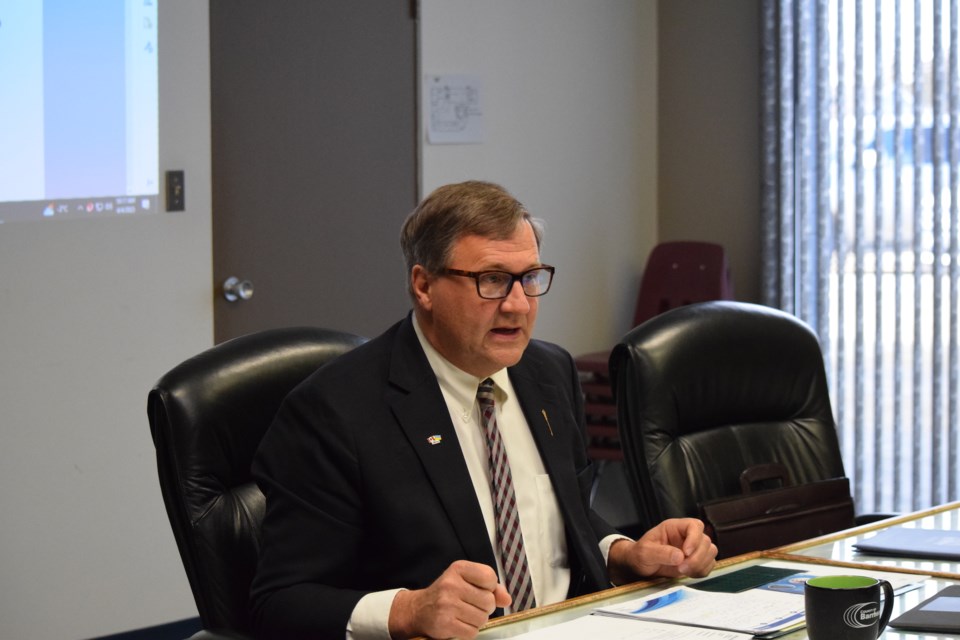BARRHEAD - County of Barrhead councillors expressed a concern to Athabasca-Barrhead-Westlock MLA that municipalities might be on the hook to clean up green energy installations, including if they are on private land, during his April 4 visit.
Reeve Doug Drozd said he echoing the concerns of the Rural Municipalities of Alberta (RMA), which at their fall convention in November passed a resolution to have the province mandate that energy companies must post a "surety bond" as a condition of any renewable energy project before any approval by the Alberta Utilities Commission (AUC).
The AUC is a quasi-judicial independent agency established by the Government of Alberta, responsible for ensuring that the delivery of utility service takes place in a manner that is fair, responsible and in the public interest. It regulates investor-owned natural gas, electric, and water utilities and certain municipally-owned electric utilities.
"The placement of renewables on agricultural land is a contentious issue, and I think everyone here is concerned about preserving good farmland for agricultural purposes," Drozd said.
However, he said, county councillors and the RMA are concerned that counties will end up holding the bag for potential cleanup costs of a half section or 640 acres after a renewable energy project has come to the end of its lifecycle.
He added that although the AUC requires that an energy company provide proof that they will reclaim a site as part of its regulatory application process through Rule 7, that is not enough for municipalities.
"(From the perspective of RMA) we are not satisfied with that response from the AUC and the (ministry of energy)," Drozd said. "If (the AUC) believes they have adequate security by a company giving its word, they are going to be surprised. Because we know from the (oil and natural gas) field experience that those companies disappear, change hands, and form phantom companies."
He added that RMA's request to have monies set aside for future reclamation of decommissioned green energy sites is commonplace in other industries including sand and gravel operations, coal and oil-sands mining, metal production plants, and waste management facilities.
Curiously, the province does not need financial security for oil and gas pipelines, electricity transmission lines or well sites.
Coun. Walter Preugschas interjected, saying that he is not opposed per se to renewable energy projects but does not believe they are "green" solutions.
"How is a green solution if you cover 3,000 acres of land? That is almost the opposite of a green solution," he said. "If they are on top of barns and other places where the ground is already covered, I could see it. But to cover the land with them, it doesn't make sense to me."
van Dijken admitted that he did not know a lot about the issue until a recently when he had a conversation with Westlock County reeve Christine Wiese about how they felt about Acestes Power ULC’s efforts to build a 24-megawatt (MW) solar power farm two kilometres north of the Town of Westlock.
He added that Wiese told him that council did not learn about the project Acestes Power ULC until "late in the game on Feb. 24.”
"The fact that (Westlock County council) was not privy to any of the development discussion until then was a real red flag for me," van Dijken said.
He noted that a UCP colleague in southern Alberta reported similar concerns from one of the municipalities in his riding, indicating they were not included in most of the development discussion of a proposed project.
"Any time a project like this goes forward, full transparency is important and there be no hint that the company is trying to ram the project through before anyone knows about it. Residents are justifiably concerned and deserve to have their questions answered," van Dijken said.
He also shares Preugschas' scepticism of whether any green energy project is "green" if it covers countless farmland.
"Now we are taking productive farmland, which is sequestering carbon and stopping that for solar panels," van Dijken said. "Certainly, those types of questions need to be answered."
However, he said it is as much a property rights issue as it is a surface rights application.
van Dijken added that under current regulations, the province allows the oil and natural gas industry to access private landowner's property for things other than surface rights, such as mineral rights.
"The government needs to have regulations and processes in place to ensure (the land) is taken care of when it is all done," he said. "Now we are talking about surface rights. We need to have conversations to understand how it fits into the existing rules. But it is an energy installation regardless of whether you are putting in a natural gas generation or solar power, I would suggest that you need to put in parameters that recognize the risks of end of life for those projects."
Barry Kerton, TownandCountryToday.com



